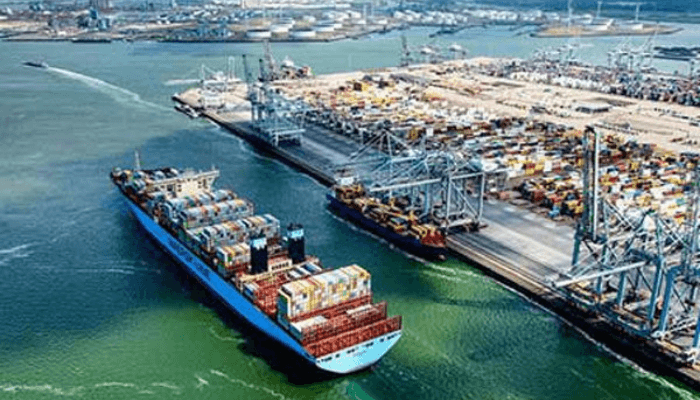The Shipping Agencies, Clearing and Forwarding Employers Association (SACFEA) has called on the federal government to reduce the cost of doing business at the ports, to stop the diversion of cargoes from Nigeria’s seaports and neighbouring countries’ seaports.
The chairman of SACFEA, Boma Alabi said, the high cost of doing business at the nation’s seaports is working against the country as smaller countries have taken advantage to wrest cargo from Nigeria.
Speaking to LEADERSHIP at a press conference over the weekend, Boma said, the high cost of berthing vessels is making Nigerian Ports uncompetitive to Customers.
She argued that Nigerian Ports have become uncompetitive because of the several charges customers are made to pay at the port as compared to neighbouring Ports like Cotonou and Lome, which collect relatively low charges.
Citing the example of Terminal 3 at Tema Port which is a dedicated container terminal that operates 3 berths is and capable of receiving ships of 366m LOA and16 metres draught at Ghana, she said, Tema Port does 1.9m TEUs while Nigeria does 1.2m TEUs per year according to a report by NPS Meridian Port Services Limited in 2024.
She lamented that the Vessel berthing charges at Tema Port are 15,000 dollars but are 150,000 dollars in Nigeria, and considering the 15 per cent increment in the Ports and Marine Fees by the Nigerian Ports Authority charges, it is about 200,000 dollars presently.
The SACFEA boss said, a 20ft container costs N55,000 and a 40ft container costs N100,0,,00 but now, a 20ft container costs N145,000 and a 40ft container costs N290,000 without port charge and logistics fees.
However, she said, while also comparing these same costs with what is charged in Lome to be 26,000 dollars, Cotonou- 27,000 dollars, Singapore- 29,000 dollars, Shanghai 21,000 dollars, Abidjan-60,000 dollars.
She emphasised that the statistics above showed that Nigerian Ports are not competitive, so an investor would rather go to a place where he can get a good return on investment than invest in Nigeria.
“We were not informed about the charges before the government implemented them. The government should try to make the ports competitive and attractive, which can be achieved through a reduction of port charges.
“If port charges are reduced, cargo throughput will increase, then the government will make more revenue, and there will be enough jobs available for the youth,” Alabi said.
She also said, the indirect taxation that customers have to pay is making the Nigerian business environment unfriendly to business and investment as there are no new factories or manufacturing companies, and the unemployment gap is widening daily.
She complained about the dilapidated port structures, queues from cargo trucks, potholes on port access roads, human toll gates, and government agencies collecting fees, which are eventually transferred to the transportation costs borne by the masses.
She averred that the Blue Economy Project is a dead-on-arrival Project because of the mind and attitude of the federal government, which is anti-business. She called on the federal government to stop dollarizing the economy. “The 15 per cent increment in Shipping Charges is a triple increment on the amount we used to pay. Just like the Customs four per cent is suspended, please help us remove it. We are pleading,” she said.
Earlier, the deputy managing director, CMA/CGM Nigeria, Ramesh Saraf asserted that, with international investment, the Lekki Free Trade Zone was set in place, but as regards transhipment, he said the infrastructure is underutilised. “Lekki Deep Sea Port started operation in April 2023 with less than half capacity of cargo, and now less operation is taking place at the port. The cost of operation in Lekki Deep Sea Port is triple the port charges in other ports across the world,” Saraf said.
He said, the jobs carried out there are less than half in terms of volume, and with the new 15 per cent increase in Port and Marine Fees, transhipment is now more than three times as expensive as compared to what is charged in other ports. Consequently, he lamented that Nigerian importers and exporters take their products to Ghana and Cotonou Ports while finding a way to bring them back into the Country for sale.
Let us not kill the cargo business in the name of increasing revenue, he lamented.
However, the Nigerian Ports Authority has refuted the claims of the SACFEA boss, saying a lot of factors determine the cost incurred on sizes of containers and cost of berthing vessels which include gross tonnage of the vessel (GRT), unit of Twenty-foot Equivalent Unit (TEUs) discharged or loaded, the origin of the cargo, the status of the terminal of operation, Length Overall of the vessel (LOA)amongst others.
A source who craved anonymity, because he’s not authorised to speak, averred that many operations do not have exact statistics on these factors, so it is almost impossible to tie all taunted values to NPA port charges vis-a-vis the countries listed against Nigeria.
“The submission forwarded, therefore, is vague. How could a 20ft container that cost N55,000 before a 15 per cent increment now cost N145k? That would be a 263 per cent increase, whereas the 15 per cent increment is supposed to be N63,240. In the same vein, a 40ft container that cost N100k increased to N209,000 at a 209 per cent increment as against 15 per cent, which ought to be N115,000.
“Also, according to their claim, a vessel that costs $150,000 to Berth before a 15 per cent review rose to $240, 000 which is a 160 per cent rise as against a 15 per cent increase. Meanwhile, similar operations cost more in smaller countries.,” the source noted.





